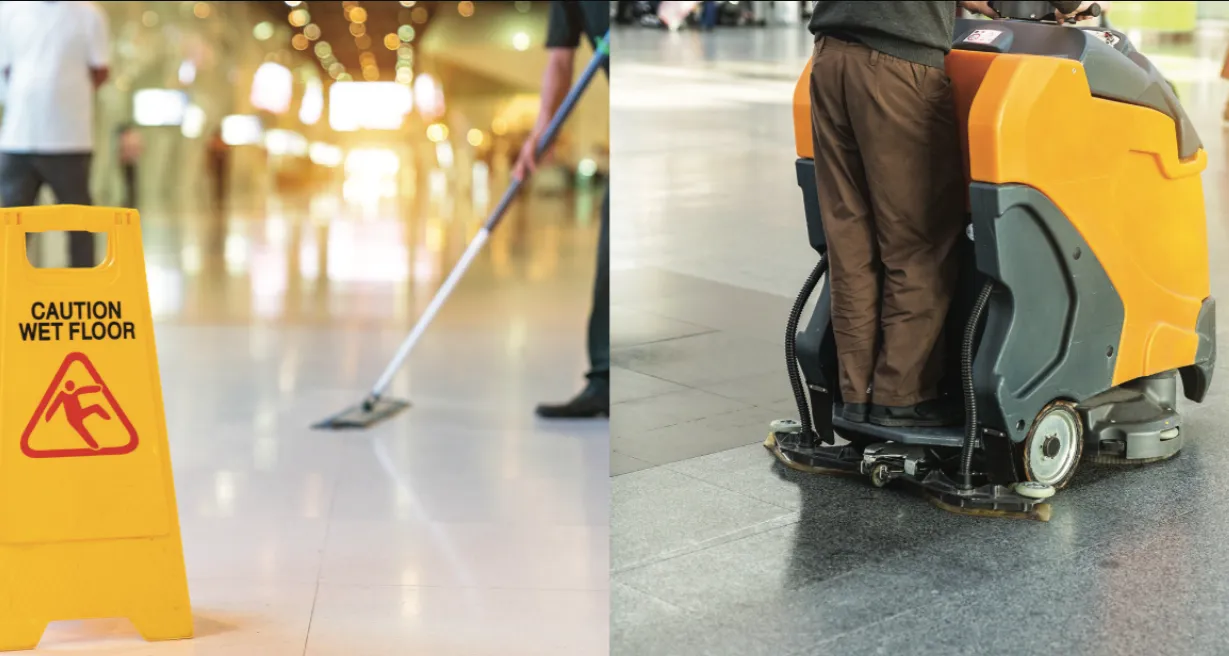Janitorial services refer to the regular, ongoing maintenance and upkeep of a facility. The emphasis is on maintaining clean, tidy, and functional spaces on a daily or regular basis. Janitorial staff handle routine tasks that prevent dirt and disorder from accumulating beyond acceptable levels.
Some typical responsibilities of a janitorial service include:
- Sweeping, mopping, and vacuuming floors
- Emptying trash bins and replacing liners
- Dusting surfaces (desks, shelves, ledges)
- Cleaning and sanitizing restrooms; restocking consumables (soap, paper, etc.)
- Wiping down common touchpoints (door handles, switch plates)
- Basic kitchen or break-room cleaning (sinks, counters)
- Minor maintenance tasks (e.g., replacing light bulbs, checking for leaks)
Because janitorial work is consistent and frequent, janitors often work during off-hours (early morning, evening, or overnight) to avoid disrupting regular business operations.
Professional / Commercial Cleaning Services
In contrast, professional (or commercial) cleaning services focus on deeper, more specialized, and less frequent tasks that go beyond daily maintenance. These are often project-based or scheduled periodically (e.g. weekly, monthly, quarterly).
Common types of cleaning tasks in this category include:
- Deep carpet cleaning or extraction (stain removal)
- Hard floor care: stripping, waxing, polishing, buffing
- Tile and grout restoration
- Window washing (interior and exterior)
- Pressure washing of exterior surfaces
- Upholstery and furniture deep cleaning
- Post-construction cleanup
- Specialized disinfection/sanitization protocols
- HVAC vent cleaning, duct cleaning, or other facility systems
Commercial cleaning services demand specialized equipment, stronger cleaning agents, and staff trained for these more intensive tasks.
Key Differences (with Latest Insights)
1. Frequency and Scheduling
- Janitorial services are routine and regular—daily, several times a week, or at least weekly. Their purpose is to maintain a baseline of cleanliness.
- Professional cleaning is episodic or periodic—scheduled based on need or condition. It is not expected to be performed daily.
2. Scope and Intensity
- Janitorial services emphasize maintenance, not restoration. The tasks are generally lighter and preventive.
- Professional cleaning services emphasize restoration, deep cleaning, and intensive interventions that go “beneath the surface.”
3. Equipment, Tools & Expertise
- Janitorial teams use standard cleaning equipment (mops, vacuums, basic chemicals).
- Commercial cleaners often bring industrial-grade machines (e.g. floor buffers, carpet extractors, high-pressure washers) and chemical protocols that require specialized training.
4. Cost Model and Contract Type
- Janitorial services are commonly contracted under ongoing contracts with predictable monthly fees, reflecting consistent service.
- Professional cleaning often works on a per-project or per-task basis, with cost depending on complexity, surfaces, area, and frequency.
5. Goals and Outcomes
- The goal of janitorial work is to keep a space presentable, hygienic, and functional on a routine basis.
- The goal of professional cleaning is to revitalize, restore, sanitize, or deep-clean what regular maintenance can’t fully manage.
When to Use One, the Other, or Both
Use Janitorial Services When
- You need daily or frequent maintenance (offices, schools, clinics, retail).
- You want to maintain cleanliness and hygiene without letting dirt build up.
- Tasks are largely generic and non-specialized (trash, dusting, floors, restrooms).
Use Professional Cleaning Services When
- Surfaces need renewal or restoration (e.g. stripping & waxing floors, deep carpet cleaning).
- You have strong sanitation or regulatory requirements (e.g., hospitals, laboratories).
- You are preparing for a major event, a grand opening, or after construction.
Often, facilities will combine both: janitorial services maintain daily function, and commercial cleaning services are scheduled periodically for a deep refresh.
In your planning and vendor selection, it’s helpful to review what each provider includes. For example, a quality Janitorial Cleaning Service might highlight traits such as reliability, flexibility, and consistency in daily maintenance.
Summary
In sum, while the terms “janitorial” and “cleaning services” are sometimes used interchangeably, they represent distinctly different levels of service:
- Janitorial services = routine, frequent maintenance, cleaning and light upkeep
- Cleaning services = deeper, specialized, periodic cleaning and restoration
Understanding the difference helps you match your facility’s needs to the appropriate service and budget accordingly. Many organizations benefit from a hybrid approach, using janitorial services for daily upkeep and commissioning professional cleaning periodically to address deeper or more demanding tasks.



